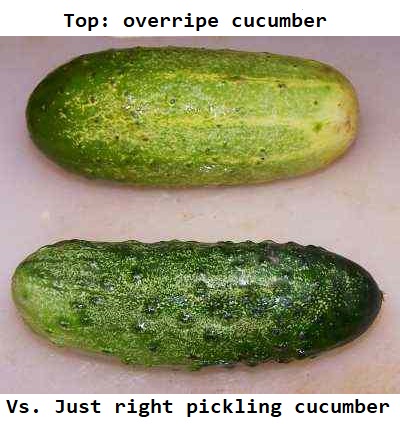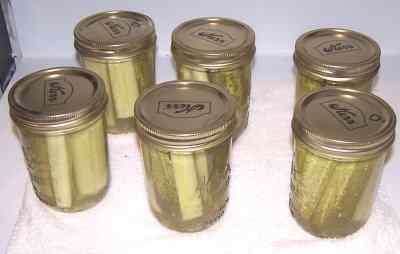
Cucumber U-Pick Orchards in Southeast Alberta, Canada in 2025, by county
Below are the U-Pick orchards and farms for cucumbers that we know of in this area.
Not all areas of a province or region have cucumbers farms that are open to the public. If you know of any others, please tell us using the add a farm form!
Remember to always check with the farm's own website or Facebook page before you go - or call or email them if they don't have a website or Facebook page. Conditions at the farms and crops can change literally overnight, so if you want to avoid a wasted trip out there - check with the farm directly before you go! If I cannot reach them, I DON'T GO!
PLEASE report closed farms, broken links and incorrect info using the "Report Corrections" form below.
New! As inflation remains high, see this page for
reliable (tested) brands of generic canning lids at lower
costs, and cost-saving measures for
getting fruit and vegetables and home canning.
If you are having a hard time
finding canning lids, I've used these, and they're a great price & ship in 2 days.
New! Road tripping and camping is a great way to have a fun, safe and inexpensive family trip. The national and state parks and monuments are open, and campgrounds usually cost between $10 and $40 per night. September to November is the best camping weather. See our new website Road Tripping and Camping.com for tips, tricks, guides, checklists and info about parks, monuments and other places to visit.
New! We just went live with our latest website, FunFactoryTours.com - As they name implies, you can find a fun factory tour, including chocolate, automobiles, historical forts and sites, famous buildings, Active Federal facilities even fun geology: like fossils and volcanic areas
Southeast Alberta
- Garden Of Van Ee-den - beans, beets, carrots, cucumbers, onions, peas, summer squash, winter squash, strawberries, tomatoes, other vegetables, prepicked produce, gift shop, snacks and refreshment stand, restrooms, picnic area
Range 16 Road 2 , Rosemary, AB T0J 2W0. Phone: 403-378-4420. Email: info@vaneedenupick.com. Open: Check website for days and hours of operation as they change with the fruit and vegetable availability. Click here for a map and directions. Payment: Cash, Check, Visa, MasterCard. Fax: 403-378-4432. . : 1 mile north and 2 miles west of Rosemary, Alberta on Secondary Highway 550, turn south onto RR16-2. See printable map on website click here for picking updates. Crops are usually available in July, August, September, October June-bearing Strawberries typically July 5th through August 1stPesticide free strawberries and vegetables - Gentle Giant Acres - No pesticides are used, cherries (pie or sour), currants (red), haskaps, raspberries (red), strawberries, other berries, beans, beets, pie or tart cherries, corn (sweet), cucumbers, kale, lettuce or salad greens, onions, snap peas (edible pod), snow peas (flat edible pod), rhubarb, summer squash, winter squash, sunflowers, Mint, Rosemary, Sage, Fresh eggs, gift shop, concessions or refreshment stand, porta-potties, picnic area, picnic area you may bring your own food, pony rides, petting zoo, farm animals, birthday parties, school tours, group reservations, events at your location (call for info)
211058 Alberta 52, Lethbridge, AB T0K 2N0. Phone: 403-382-9879. Email: ggacres@hotmail.ca. Open: By Appointment 7am to 8pm Monday to Saturday through the season. Directions: 6 kilometers west of Alberta 845 and 52 junction. Strawberry season usually begins in June; Raspberry season usually begins July 15; U Pick Gardens are . Click here for a map and directions. Payment: Cash, only.
Gentle Giant Acres Facebook page. rta 52, Lethbridge, AB T0K 2N0 open in June; Garden Mazes open July to November 1;. We do not use pesticides on the crops Buffalo Berries are available as PYO. (ADDED: August 18, 2022) - U Pick Magrath - Strawberries, Sweet Peas, Carrots, Potatoes, Cucumbers, Pumpkins, Corn, Chokecherries, Saskatoon Berries, Tomatoes, restrooms, picnic area
Range Road 221, off Highway 5 between Magrath and Lethbridge, Magrath, AB T0K 1J0. Phone: 403-758-6376. Email: sherylinl@yahoo.com. Open: June, sometimes July, open every day, by appointment call 403 758 6376. Click here for a map and directions. Payment: Cash, only. (UPDATED: June 13, 2024, JBS)
Comments from a visitor on July 27, 2010: "Easy access, flexible hours, good produce; Generous portions, safe for kids, it is fenced and laid out well with good visibility across the fields"
Cucumber
Cucumber Picking Tips, Recipes and Information

When it comes to selecting cucumbers at a farm, there are a few key tips to keep in mind to ensure you choose the best ones. Here are two to three
paragraphs of guidance to help you make the right selection:
1. Look for firmness and texture: The first thing you should check is the firmness and texture of the cucumber. Gently squeeze the cucumber to
determine its firmness. A good cucumber should feel firm but not rock-hard. Avoid cucumbers that are overly soft or mushy, as these are signs of
deterioration. Additionally, examine the skin texture. It should be smooth and shiny, without any wrinkles or blemishes. A uniformly colored skin is
also an indicator of a fresh cucumber .The top cucumber in the photo is an overripe pickling cucumber. The bottom cucumber is perfect!
2. Smaller size is better: Cucumbers come in various sizes and shapes, so it ultimately depends on your personal preference. However, there are a
few general guidelines to follow.
Choose slicing cucumbers that are about 6 to 8 inches long, as they tend to have a better flavor and texture.
Burpless cucumbers may be much longer . Pickling cucumbers should be smaller, like 4 to 5 inches.
Avoid
extremely large cucumbers, as they can be tough and have large seeds. In terms of shape, look for cucumbers that are straight and cylindrical. Avoid
ones that are excessively curved or have bulges, as they may have developed irregularities during growth.
3. Look for dark color and freshness: The color of the cucumber can provide valuable information about its freshness. Ideally, cucumbers should have a
vibrant green color, indicating that they are ripe and freshly harvested. Avoid cucumbers that have a dull or yellowish color, (like the top cucumber
in the photo) as this could be a sign
of overripeness or age. Additionally, check the stem end of the cucumber. It should be fresh-looking and not shriveled or dried out. A fresh cucumber
will have a crisp snap when broken, while a stale one may feel limp or bend without resistance.
Cucumber Varieties
There are many types of cucumbers so it is important to select the right type for your purpose.
1. Pickling Cucumbers: Pickling cucumbers are specifically cultivated for making pickles. They are smaller in size, have a firm texture, and a
slightly bumpy or knobby skin. Pickling cucumbers often have a more concentrated flavor, making them ideal for preserving in brine or vinegar.
Gherkins are simply very small (1.5 to 2.5 inch long immature pickling cucumbers.
2. Slicing Cucumbers: Slicing cucumbers are the most common type of cucumber found in grocery stores. They are typically larger than pickling
cucumbers and have a smooth, dark green skin. Slicing cucumbers are great for fresh eating and are often used in salads, sandwiches, or as a
refreshing snack.
3.Burpless, English or European Cucumbers: English cucumbers are longer and thinner than slicing cucumbers. They have a mild, crisp taste and a thin,
tender skin that does not require peeling. These cucumbers are often referred to as "burpless" due to their reputation for being less likely to cause
indigestion or gas.
4. Persian Cucumbers: Persian cucumbers are similar to English cucumbers but slightly shorter and thicker. They have a sweet and crunchy flesh,
and their skin is thin and edible. Persian cucumbers are popular in Mediterranean and Middle Eastern cuisine and are great for salads or as a healthy
snack.
5. Lemon Cucumbers: Lemon cucumbers are small, round cucumbers that resemble lemons in shape and color. They have a mild, slightly sweet flavor
and a thin, tender skin. Lemon cucumbers are often eaten fresh, added to salads, or pickled.
6. Armenian Cucumbers: Armenian cucumbers, also known as snake cucumbers or yard-long cucumbers, are long and slender with a twisted or curved
shape. They have a thin, pale green skin and a crisp texture. Armenian cucumbers are often used in salads, sandwiches, or pickled.
7. Kirby Cucumbers: Kirby cucumbers are small, bumpy cucumbers that are popular for pickling due to their firmness and crunchy texture. They
have a slightly bitter taste and are known for their ability to retain their shape and crunchiness during the pickling process.
These are just a few examples of cucumber types and varieties. Each has its own unique characteristics, so you can choose the one that best suits your
culinary needs and preferences.
Pickling Cucumbers (in water bath canners )
Cucumbers are not acidic so they ONLY way you may safely can them is as pickles:
- Bread and butter cucumber pickles - W, P
- Cucumber pickles (kosher dill, bread & butter, or processed etc.) using mixes - W, P
- Dill pickles, from scratch - W, P
- Old-fashioned fermented general store barrel dill pickles - W, P - (more photos coming)
- Cucumber pickle relish! - W, P - This is the classic hamburger relish!
- No-canning-needed refrigerator cucumber pickles (kosher dill) - W, P
- Low salt / reduced salt low calorie dill pickles.
- Low-salt bread and butter pickles
- Sweet Pickled Gherkins - W, P
- Sweet Pickles (quick recipe) - W, P
- Zucchini pickles (bread-and-bu
Other Local Farm Products (Honey, Horses, Milk, Meat, Eggs, Etc.)
(NOT pick-your-own, unless they are also listed above)
- Farm markets and roadside stands
- Local Honey Finder
- Local Meat, Milk and Eggs
- Venues: Farms, Wineries, Orchards for your event, wedding or party
- Easter egg hunts
- Children"s consignment sales
- Fruit and vegetable festivals
- Winery tours and wine tastings
- Horse rides, stables, lessons, trails
- Maple Syrup farms and sugarworks
- Bed & Breakfasts on Farms, Wineries, Ranches and Orchards
- Pumpkin patches
- Corn mazes
- Zombie Paintball venues
- Christmas Tree Farms & lots
- Environmental resources
- Consumer fraud information
- Wholesale food sources
- Resources for Farmers
Looking for canning equipment and supplies?
Water bath canner with a jar rack
Pressure canners for gas, electric and induction stoves: Presto 23Qt or T-fal 22Qt
Canning scoop (this one is PERFECT)
Ball Blue book (most recent version)
Jars: 8oz canning jars for jams
Find Other types of farms:
Farm markets and roadside stands
Road trips and camping resources
Local Honey, apiaries, beekeepers
Consumer fraud and scams information
Home canning supplies at the best prices on the internet!
Maple Syrup Farms, sugarworks, maple syrup festivals
Environmental information and resources
Farms For Your Event for birthday parties, weddings, receptions, business meetings, retreats, etc.
Festivals - local fruit and vegetable festivals
Get the
most recent version of
the Ball Blue Book
With this Presto 23 quart pressure canner and pressure cooker, you can "can" everything, fruits, vegetables, jams, jellies, salsa, applesauce, pickles, even meats, soups, stews. Model 01781

You can make jams, jellies, can fruit, applesauce, salsa and pickles with water bath canners, like this Granite Ware 12-Piece Canner Kit, Jar Rack, Blancher, Colander and 5 piece Canning Tool Set

